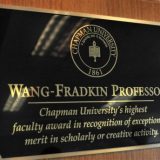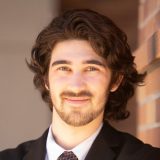ECOS Recognized for Commitment to STEM Students
July 18, 2022
Usually, the Golden 3D-Printed Crescent Wrench Award is exactly what it sounds like. Given annually to a community partner that has contributed to the success of Chapman University’s Grand Challenges Initiative, the honoree receives a plaque with a golden 3D-printed crescent wrench. Except that this year’s wrench was made from soap.
That is because this year’s honoree was ECOS, a local and family-owned company that has been making environmentally friendly cleaning products since 1967. Among the products made by ECOS are small sheets of liquidless laundry detergent, which arrive in a recyclable paper container and reduce the carbon emissions of transport by weighing only a fraction of traditional liquid detergent bottles.
“ECOS really embodies the spirit of the Grand Challenges Initiative by using science and engineering to make the world around us a better place,” says Michael Ibba, dean of the Schmid College of Science and Technology.

Larissa Atkins ’22, an environmental science and policy major, carries out the protocol that she and her teammates designed to make a standardized dirty dish for an experiment in their project with ECOS.
For the past two years, student teams in the Grand Challenges Initiative have been working with Jenna Arkin, the company’s director of innovation, to help develop and test transformative new products. That has meant that the program’s makerspace laboratory, usually the realm of chemistry experiments and device engineering prototypes, has also been home to giant piles of dirty dishes and vats of tomato sauce. Students have been testing new materials that could make cleaning up after dinner not only easier, but also reduce the footprint of water, carbon, and waste in the process.
To put the project in context, student teams have also had the opportunity to tour the ECOS headquarters and meet directly with the executive team to present updates on their project. “To have ECOS throw open the doors of their laboratory and factory for our students is a transformative experience. It allows us to contextualize the experiences in the classroom and laboratory with the real-world challenges that companies face every day. The result is that we train more sophisticated and savvy students,” notes Greg Goldsmith, Ph.D., who serves as the director of the Grand Challenges Initiative. “This can all start with a seemingly simple question: how does one quickly and quantitatively measure whether or not a dish is really clean?”
The relationship between the Grand Challenges Initiative and ECOS came naturally. In 2021 and 2022, ECOS was honored as a top employer in recognition of their strong alumni base on their team and intentional recruiting practices with Chapman – always seeking to bolster the pipeline of top-notch Chapman talent in their business and environmental science roles. ECOS Chief Executive Officer Kelly Vlahakis Hanks and Senior Director of Corporate Communications and Government Affairs Kristine Waldren met while completing Chapman University’s Executive MBA program in 2017.
The learning is still going both ways. Arkin, the director of innovation, will begin her executive MBA at Chapman this fall, while just a few buildings away student teams in the Grand Challenges Initiative will devise experiments to clean more while using less.
Cover photo: (From left to right) ECOS Director of R&D Ryan Hood, Communications Director Kristine Waldren, CEO Kelly Vlahakis Hanks, and Chapman University’s Greg Goldsmith.


